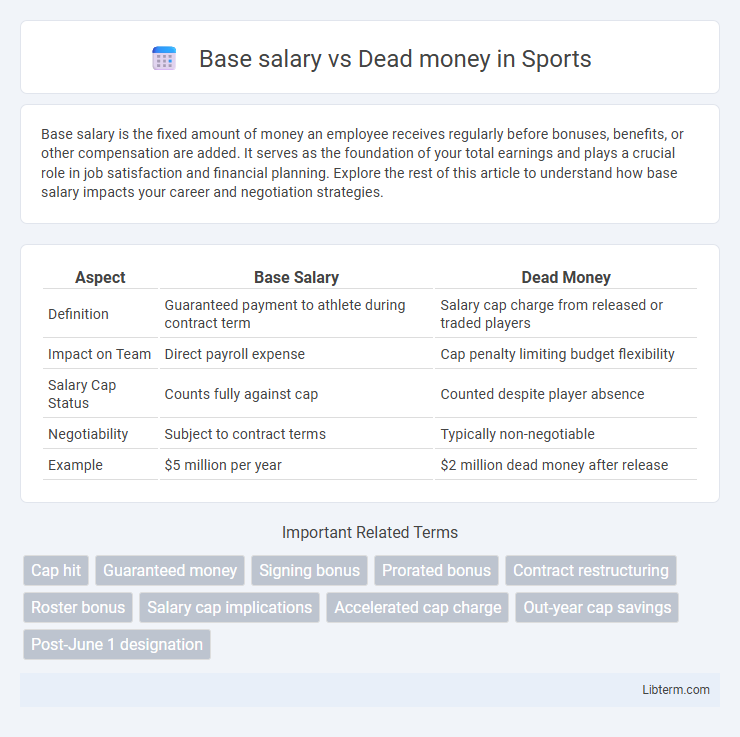Base salary is the fixed amount of money an employee receives regularly before bonuses, benefits, or other compensation are added. It serves as the foundation of your total earnings and plays a crucial role in job satisfaction and financial planning. Explore the rest of this article to understand how base salary impacts your career and negotiation strategies.
Table of Comparison
| Aspect | Base Salary | Dead Money |
|---|---|---|
| Definition | Guaranteed payment to athlete during contract term | Salary cap charge from released or traded players |
| Impact on Team | Direct payroll expense | Cap penalty limiting budget flexibility |
| Salary Cap Status | Counts fully against cap | Counted despite player absence |
| Negotiability | Subject to contract terms | Typically non-negotiable |
| Example | $5 million per year | $2 million dead money after release |
Understanding Base Salary: The Foundation of NFL Contracts
Base salary represents the guaranteed annual amount a player earns during the NFL season, forming the core financial element of contracts. Unlike dead money, which is the salary cap charge for terminated contracts or released players, the base salary directly impacts a player's income without penalties. Understanding base salary is essential for evaluating player value and contract structures within the NFL salary cap system.
What Is Dead Money in the NFL?
Dead money in the NFL refers to salary cap space allocated to players no longer on a team's roster, usually resulting from guaranteed bonuses or unamortized signing bonuses. Unlike base salary, which is the payment players receive for active service during the season, dead money counts against the salary cap despite the player not contributing on the field. Teams must manage dead money carefully to maintain roster flexibility and optimize cap space for current player contracts.
Key Differences Between Base Salary and Dead Money
Base salary refers to the guaranteed amount a player earns during a contract period, directly impacting team payroll and player motivation. Dead money represents the salary cap charge for a released or traded player's remaining guaranteed money, often limiting team financial flexibility despite the player no longer being on the roster. The key difference lies in base salary being active compensation, whereas dead money is a sunk cost affecting salary cap management.
How Base Salary Impacts Team Salary Caps
Base salary directly affects a team's salary cap by counting fully toward the cap limit, impacting available funds for player acquisitions and contract extensions. High base salaries reduce cap flexibility, potentially limiting roster improvements and strategic signings. Teams must balance competitive base salaries with overall cap management to maintain optimal team construction.
The Role of Dead Money in Cap Management
Dead money refers to the portion of an NFL team's salary cap allocated to players no longer on the roster, primarily due to released or traded contracts. It impacts cap management by limiting financial flexibility, as teams must account for these charges while trying to sign new talent or retain key players. Efficient dead money management enables teams to optimize salary cap space, balancing current roster needs with long-term contract strategies.
Examples: Base Salary vs. Dead Money in Real Contracts
Base salary in NFL contracts refers to the guaranteed amount a player earns for their active participation during the season, such as a $10 million base salary for a quarterback in 2024 with no deductions. Dead money represents the salary cap charge for a released or traded player, like the $8 million dead money a team incurs when a linebacker is cut despite a $5 million base salary that year. Understanding these terms clarifies how teams manage salary cap space, balancing active player compensation with financial penalties from contract terminations.
Why Teams Accumulate Dead Money
Teams accumulate dead money primarily due to guaranteed portions of player contracts being paid after trades or releases, impacting salary cap flexibility. Dead money results from the prorated signing bonuses that remain on the books even when players no longer contribute on the field. Managing dead money is crucial for teams to balance current roster investments while navigating salary cap constraints.
Strategies to Minimize Dead Money
Minimizing dead money in NFL contracts requires strategic structuring of base salary with signing bonuses and roster bonuses to spread cap hits over multiple years. Incentives and performance-based pay can reduce guaranteed amounts, limiting cap penalties upon release or trade. Effective contract management involves front-loading guaranteed sums into bonuses while negotiating base salaries that allow flexible roster decisions without excessive dead money accumulation.
Player Perspective: Base Salary vs. Dead Money
From a player perspective, base salary represents the guaranteed income earned for active participation on the team, influencing contract negotiations and financial security. Dead money refers to the cap charges for a player no longer on the roster, which does not benefit the player's earnings but impacts the team's salary cap flexibility. Understanding the distinction helps players and agents strategize contract structures to maximize actual earnings while minimizing dead money liabilities.
Long-Term Implications for Teams and Players
Base salary represents the guaranteed portion of a player's contract, directly impacting team payroll flexibility and salary cap management. Dead money refers to cap space occupied by players no longer on the roster, often resulting from contract guarantees or early termination clauses that limit a team's financial agility. Long-term, high dead money burdens restrict team investment in new talent, while players facing base salary reductions may seek more secure or lucrative opportunities elsewhere, influencing roster stability and overall competitive balance.
Base salary Infographic

 libterm.com
libterm.com